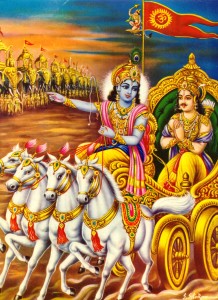 In western civilization, the language, customs, beliefs and traditions have undergone change through our Gurus’ committed practice of Purva paksha, or direct mutual engagement with major differences between the West and India. To identify without much elaboration on the elements of both the western traditions and the East, they answered the question of how can Purva Paksha contribute to the establishment of a harmonious approach to social and spiritual growth and on what basis can it fairly and effectively be pursued.
In western civilization, the language, customs, beliefs and traditions have undergone change through our Gurus’ committed practice of Purva paksha, or direct mutual engagement with major differences between the West and India. To identify without much elaboration on the elements of both the western traditions and the East, they answered the question of how can Purva Paksha contribute to the establishment of a harmonious approach to social and spiritual growth and on what basis can it fairly and effectively be pursued.
They achieved this by using Dharma as guidance. In the central story of the Bhagvad Gita, Arjuna is confronted by the mandate to advance on the battlefield. He balks at first wishing to retreat from confrontation because he fears running away will do more harm than good. It takes much persuasion from Lord Krishna to get him to advance. Arjuna can only see this, however, by taking a stance that involves risk and a willingness to sacrifice ego in the service of dharma.
Like Arjuna, who has already perfected himself in yoga for many years and trials brought down upon him from time to time, the spiritual leaders of Swaha and other committed Hindu bodies exposed to the challenges of Purva Paksha, are often called to the engagement of their own nature and social obligations- their particular sva-dharma. In other words, it is their duty to engage, whereas it might not be the same for others with a different calling. One such manifestation and contemporary engagement is the publication explaining the difference between superstition and identifying the meaning of the traditions and practices in after-death ceremonies soon to be published.
Our identity is multifaceted. To deny any one or more parts that constitute who we are would only put us in crisis. Sanatan Dharma is dynamic, and so the teachings and guidance from our leaders have buffered and reconciled where we may not be able to through the committed practice of Purva paksh as sva dharma is retained.
Jai Swaha Maata.
Pt. Vasistha Persad


